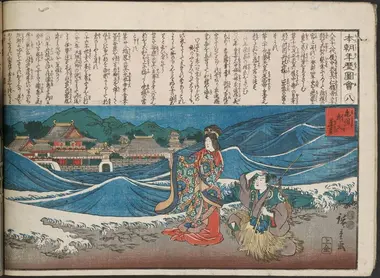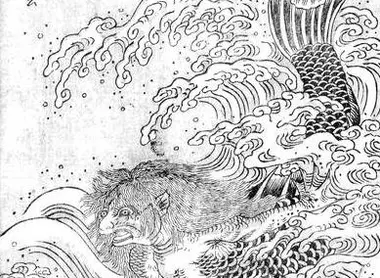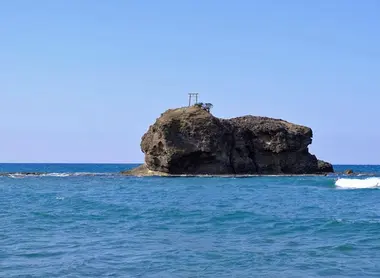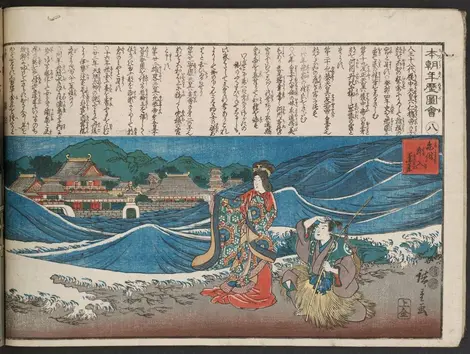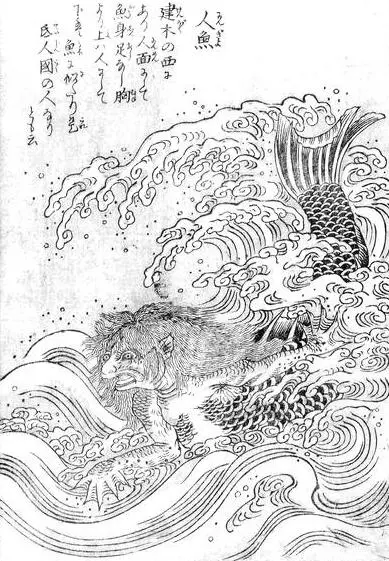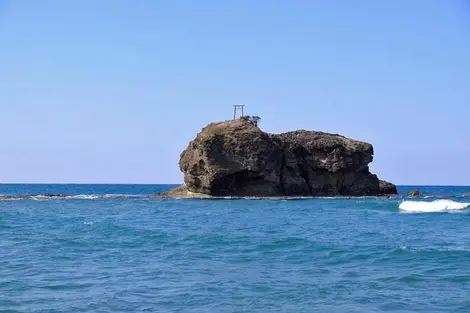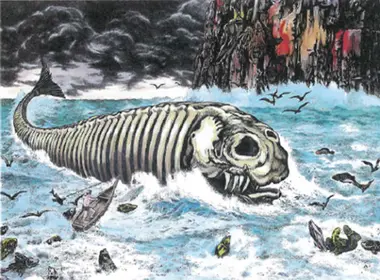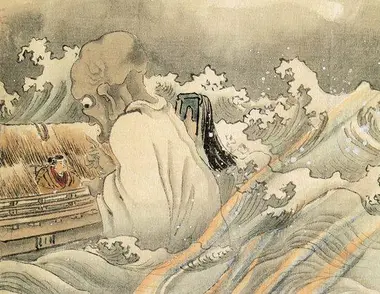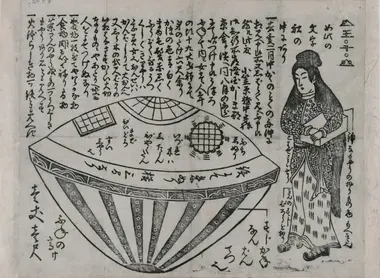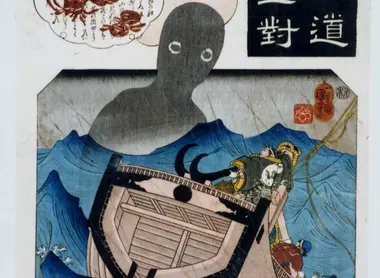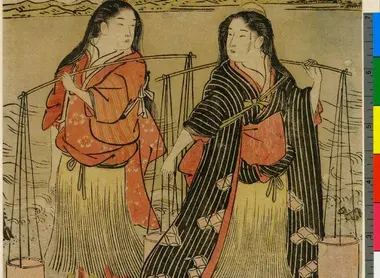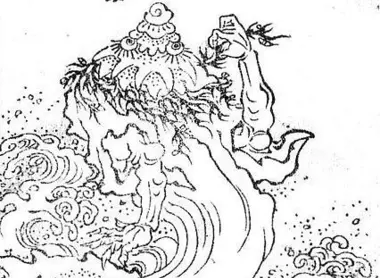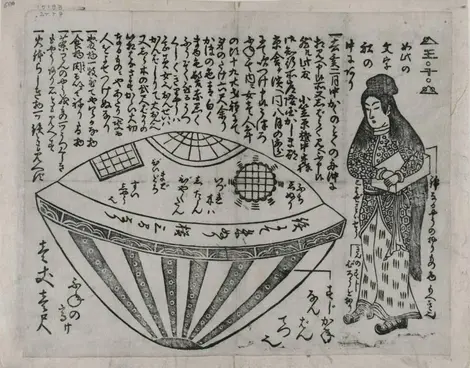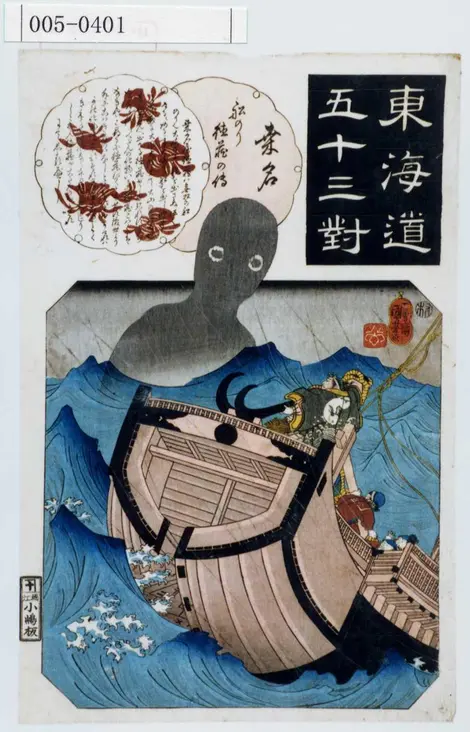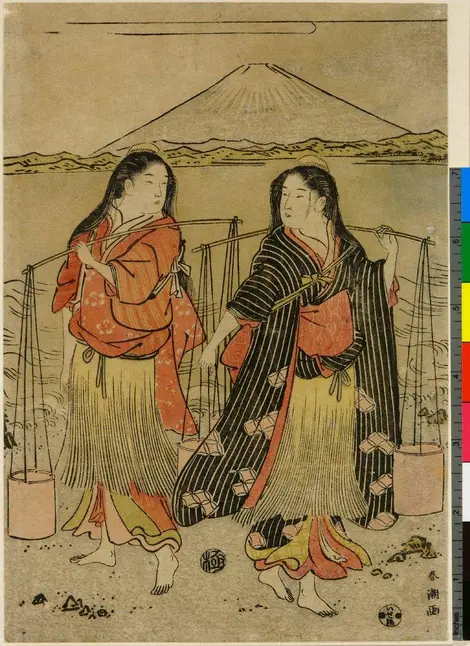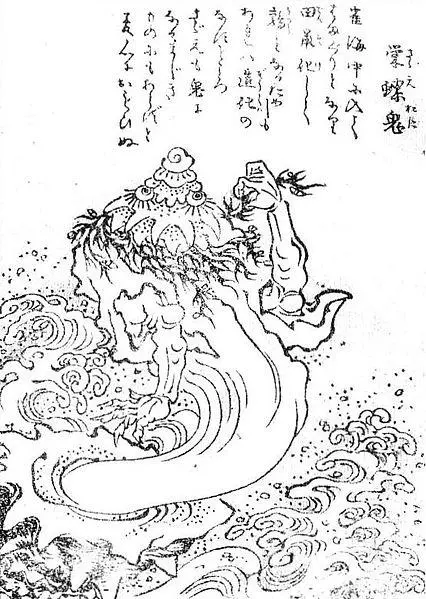Myths and legends of Japanese beaches ビーチ神話
- Published on : 26/06/2018
- by : S.V.
- Youtube
Chills at the beach
Japan is an archipelago made up of a thousand islets and almost as many legends, demonic creatures, and adjoining ghosts! Take it for granted, the Japanese beaches are not all small havens of peace!
If you already know the myth of the white rabbit on Hakuto beach, the sand that mourns tragic lovers in Kotogahama, or even the legend of the angel whose coat of feathers was stolen in Miho, discover new moving stories, frightening and surprising hidden in the turquoise waters and the white sand of the beaches of the archipelago.
Urashima Taro
The legend of the young fisherman Urashima Taro is told in the Man'yoshu, a collection of poems dating from the 5th to the 9th century. It was later translated by the British Japanologist Chamberlain in his series of "Japanese fairy tales" at the end of the 19th century. Having gone to sea, Urashima Taro saves a turtle trapped by his hook because the animal is consecrated to the God Sea Dragon. Shortly after this episode, the daughter of the Sea Dragon god, dressed in rich crimson and azure garments, comes to him. His father sends him to thank him for his great kindness towards the sacred animal. If Urashima Taro wishes, he can join the palace of the Dragon King of the Sea where their marriage will be celebrated. The future spouses then reach “the island where summer does not die”.
For three years, happiness persists. However, the young man feels a lot of sadness when he thinks of his family, which he left without the slightest explanation. Despite pleas to hold him back, his wife allows him to leave the kingdom to bid farewell to his family. She entrusts him with a small box closed with a silk cord for his trip; explaining to him that he should never open it under penalty of not being able to come back. Urashima Taro leaves his wife promising not to open the precious box. Arriving on his former lands, the fisherman is disturbingly his village seems to have changed. He questions an old man who tells him that Urashima Taro died at sea 400 years ago! Stunned by this news, he goes to the cemetery where he and his family have been resting for hundreds of years. Distraught, he goes back to the beach and opens the box. His soul, in the form of white and spectral vapor, escapes from it. Within minutes, Urashima Taro crumbles into dust.
Bakekujira
The story of the bakekujira or ghost whale has been told for centuries by Japanese sailors and fishermen. This ghostly animal of which we only see the skeleton is often accompanied by a myriad of strange birds and fish. The bakekujira is said to have appeared in Shimane Prefecture off Okino Island.
One stormy night, fishermen, intrigued by the presence of a cetacean of incredible whiteness, take a boat to approach it. Arriving very close to the animal swimming in sparkling waters, one of them throws his harpoon at it.
But this one just crosses it. The men note with horror that the whale is only a skeleton. Devoid of flesh and skin, the immaculate bakekujira disappears into the night leaving the fishermen frightened.
In 1983, reality met fiction when an intact whale skeleton was sighted off the coast of Anamizu in Ishikawa Prefecture.
Ningyo
The ningyo is a mythological sea creature more commonly referred to as a Japanese mermaid or human fish. Ancient texts describe her as an "ape-mouthed being with small teeth like a fish, shiny golden scales and a clamoring voice like a lark or a flute". According to the legend of Yao Bikuni, an 800-year-old Buddhist priestess, whoever managed to eat it would obtain beauty and eternal youth.
One day in the former province of Wakasa, a fisherman brings in his nets a strange fish with a human head. He invites his friends to taste the fruit of this more than unusual peach; concealing from them that it is a ningyo. But one of them discovers it and warns all the other guests just in time. No one eats it except the granddaughter of a fisherman who brought a piece home. Completely drunk, he had forgotten to get rid of it on the way home. A few years later, her daughter gets married and finds that she is no longer aging. Eternally young, she sees her successive husbands disappear. Driven by great sadness, she becomes a priestess and crosses the whole country. At the age of 800, she returns to her native province and ends her life.
Another part of the ningyo myth is used by Hayao Miyazaki in “Ponyo on the cliff”. Indeed, its capture would cause many cataclysms on men. In the anime, Toki, one of the residents of the nursing home, fears the imminent arrival of a tsunami upon learning that Sousuke has collected a fish with a human face.
See also: Studio Ghibli

The Ponyo anime is inspired by the myth of the ningyo
allocine.fr
Funayurei
Funayurei is the ghost of people lost at sea who have become vengeful spirits. Driven by a bitter grudge against the living, they attempt to sink the boats by filling them with water using a bamboo ladle, the hishaku. Funayūrei mostly appears during bad weather nights when ships face the wind, fog, and rain. Often described as white spectral forms, they can also appear as flames or umi-bozu. In this variant, the umi-bozu is a youkai using a barrel to flood and drag boats to the bottom of the water.
It is said that in ancient times certain ships sailed with onboard hishaku pierced with holes to prevent the funayurei from accomplishing their fatal purpose and to drive them away.
To read: Japanese monsters and ghosts
Utsuro Bune
The myth of the utsuro bune (literally the “hollow vessel” ) is a veritable urban legend which has given rise to multiple theories; fascinating even to amateurs of ufology (studies of UFOs)! Several sources document this strange story that occurred in the former province of Hitachi: Kyokutei Bakin's Toen Shosetsu (1825), Hyoryu Kishu (1835), and Nagahashi Matajirō's Ume-no-chiri (1844). On a beach on the east coast of the archipelago, a very curious boat bearing strange inscriptions ran aground on February 22, 1803. From this wooden vessel with large windows, a beautiful young woman with red and white hair emerged. Speaking in an unknown language, she firmly holds a rectangular box in her hands. The somewhat frightened fishermen take her back to her boat and then watch her go back to sea.
The people of Hitachi spread this story; imagining that this woman is a princess from a distant country, banished from her kingdom following an adulterous affair. Condemned to wander at sea, she would carry the head of her executed lover in a box. Based on the descriptions of the time, historians in their recent studies have concluded that a boat was drifting, occupied by a young woman from Russia. The arrival of a foreign person on the Japanese coast when the archipelago has been cut off from the rest of the world since the introduction of sakoku in 1641 has certainly contributed to the significant impact of the legend over the centuries. Nevertheless, some prefer to believe that the legend of the utsuro bune relates to an extraterrestrial encounter!
Matsukaze and Murasame
The Matsukaze and Murasame sisters are the heroines of a Noh play whose action takes place on a beach in Suma Bay in the former province of Settsu. The two women who carry the brine to make the salt are both in love with the same man, the courtier and poet Ariwa no Yukihira (818-893) in exile on the island of Suma. The departure of the poet after three years of exile plunges Matsukaze and Murasame into deep disarray. Thus abandoned, the sisters die of grief. From then on, their ghosts wait on the beach for the promised return of the poet, cherishing his coat and his hat.
Sazae Oni
Sazae oni are demonic creatures from Japanese mythology . This monstrous youkai comes in the form of a mollusc topped with a huge shell . Originally, these would be women of small virtue thrown into the sea. The latter would then turn into sea snails and then after very long years spent in this form; some of these would become sazae oni . Able to take on a human appearance, they turn into beautiful young women to attract and devour sailors and innkeepers of coastal establishments on full moon nights.
The most famous legend about them tells how a sazae oni , in the guise of a young woman, was saved from drowning off the Kii Peninsula by pirates at sea. During the night, each pirate succumbs to the pleasures carnal with the young woman. The sazae oni , true to its demonic reputation, does not forget to cut off everyone's testicles in passing. Furious, the pirates put her back in the water where she resumes her true appearance, dancing on the surface of the waters like a dragon. Somewhat upset, the captain makes a deal with the youkai . He offers her all his gold to recover the testicles or kin tama in Japanese (literally the golden balls) of the entire crew. Gold against "golden balls", a transaction to ponder!
To go further: 3 books of Japanese legends to read
